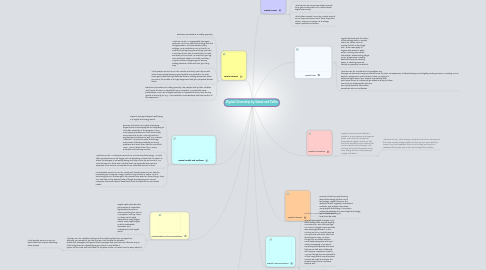Digital Citizenship by Subah and Tahlia
par 8E_ASubah 36827


1. Digital Etiquette
1.1. Digital Etiquette is a basic set of rules you should follow in order to make the internet better for others, and better for you. It’s just as important to treat people with courtesy and respect online as it is in real life. It is not enough to create rules and policy, we must teach everyone to become responsible digital citizens in this new society.
1.1.1. What we can do: Be cautious. Think before you send an e-mail,
2. Digital Rights and Responsibilities
2.1. Digital rights describes the permissions of individuals legitimately to perform actions involving the use of a computer, and any There is a basic set of rights extended to every digital citizen. Basic digital rights must be addressed, discussed, and understood in the digital world.
2.2. What we can do: Possible solutions to the problems that have emerged are Talk with your parents if you feel that you cant handle the situation Delete the messages and ignore those messages that you think are offencive to you If the bully keeps on cyberbullying you, block it, and delete it. Ignore all the mails and send them to the spam folder. You dont have to worry about it.
2.2.1. What people around us can do: Block sites that may be disturbing other people
3. Digital Security
3.1. Electronic precautions to safety guaranty
3.2. What we can do: As responsible teenagers we know a lot more about technology than the last generation. We know about privacy settings, virus protector so on so fourth. So instead of just ignoring these things just take 5 minutes of your day to check them out and see what you can learn. So next time you log onto facebook, twitter or tumblr just take a couple minutes configuring your privacy setting because a little work can go a long way.
3.3. What people around us can do: Parents and family can help us with internet security by buying a good quality virus protector. Or even some good data back-ups because there is nothing worse then when you are in the middle of a huge assignment and your computer breaks down.
3.4. Electronic precautions to safety guaranty. Like people lock up their valubles and homes the same is needed for your computer. We need this same protectetion in our use of digital security. It is essential that we have the key apects of sercurity for e.g. Virus Protectors, Data Backups and total control of the equipment.
4. Digital Health and Wellness
4.1. Physical and psychological well-being in a digital technology world.
4.2. Because of how far our highly developing digital world is developing we are forgetting to look after ourselves in the progress. Many more physical problems in the human body are caused due to this. Not only that but psychological problems as well. e.g. Internet Addiction. We need to make technology users aware of these constantly occurring problems and teach them how to avoid such crisis'. We can teach them this in many education and learning courses.
4.3. What we can do: As intensive users of our 21st century technology... to look after ourselves we can do things such as attending courses that can teach us about the dangers of unhealthy being and help us too try and avoid it. We need to keep our fluids and nutrition levels up especially when we are expected to be around a computer for an extended amount of time.
4.4. What people around us can do: Family and friends around us can help by monitoring our computer usage. Parents can put locks or timers on our technology limit so that we get a fair amount time spent on these things. They can also help on the physical side of things by swapping your normal computer chairs with special fixed back chairs to adjust to our own backs needs.
5. Digital Access
5.1. We all need to be aware of and support the foundation of digital citizenship. Leaving out members of our digital society leaves out the growth of members to our community. Businesses and Organisations also need to be aware of this. To be great working citizens we all need to be aware of this very important rule.
5.2. What we can do: Encourage others around us to get involved with our multifunctional digital community.
5.3. What others around us can do: People around us can help and remind us of these important values. They can re-assure us to always respect yourself and others
6. Digital Commerce
6.1. Digital Commerce have affected people in many positive and negative ways. There are a lot of positive things about digital commerce, but the most important one is making life much easier for lots of people. You can buy, sell and trade goods online from sitting at home and pressing a couple of buttons.
6.1.1. What we can do: When buying a product online from someone in the same country, always make sure that you can meet with the person. buy from websites that can be trusted and buy from websites that people you know have brought from before.
